[ad_1]
KANSAS CITY — Even as consumers turned increasingly to value options in the bread category over the past year, bakers have stepped up their development efforts around a wide range of value-added bread varieties. New product introductions suggest a belief that several trends, including demand for super-premium bread, indulgence and health and wellness, remain firmly in place.
The enthusiasm for developing and introducing new products comes amid continued softening volume in the overall bread category. Total center store bread sales in the year ended Feb. 26 were $10,117,354,339, up 12% from a year earlier, according to data from Circana OmniMarket (the recently adopted name of the merged IRI and NPD data collection businesses). The jump in dollar sales reflected a 13.2% increase in the price per unit for sliced bread, to $3.19. Unit sales of bread were 3.2 billion, down 1.5%.
In center store sandwich bread, private label solidly outperformed total sales of any leading vendor, according to the Circana data. Private label unit sales were 754 million, up 4% from the previous year. The gain in private label represents a reversal from the previous several years when sales of store brands fell consistently. For example, unit sales of private label were down 12.2% in the year ended Feb. 20, 2022. Private label sales were down 6.7% the year before that.
By contrast, unit volume sales over the past year were lower for all but one of the largest US baking companies, with decreases ranging from 2.2% to 7.9%. In the case of the nation’s three largest bakers, Grupo Bimbo SAB de CV was down 2.3%; Flowers Foods, Inc., was down 4%; and the Pepperidge Farm business of Campbell Soup Co. was down 4%. While all companies raised prices, the variation was considerable with Lewis Brothers Inc. leading the pack with an 18.6% price increase, and United States Bakery at the low end with a 9.2% increase. The volume and share gains over the past year were scored despite a 15% increase in the price per unit of private label bread, a figure well above the 13% average for center store sandwich bread.
Health and wellness focus
Numerous trends have been gaining traction in the bread and rolls category, including artisan style, indulgent and better-for-you products, said Ryan Paterakis, director of national sales, H&S Bakery, Baltimore.
“We decided to take the healthier route and specialize in that area where we have already seen proven success,” Mr. Paterakis said. More specifically the company has expanded its 647 lines of products with the introduction of new varieties.
“We also are doing some research and development on a sub roll and kaiser roll for foodservice and/or in-store bakeries,” he said of the keto-friendly line of baked foods.
Also falling within the company’s focus on health and wellness is its Omega Me Crazy bread.
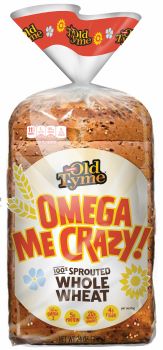 Source: Omega Me Crazy“The line has seen great success, and we are launching a new white bread in that line that will have three times as much protein per serving as a traditional white bread,” he said.
Source: Omega Me Crazy“The line has seen great success, and we are launching a new white bread in that line that will have three times as much protein per serving as a traditional white bread,” he said.Both 647 and Omega Me Crazy are sold under the Schmidt Baking Co. brand (owned by H&S), and Jeff Sobotta, vice president of Schmidt, said the 647 line of keto-friendly bread has been gaining momentum. The line was launched about eight years ago and almost didn’t survive until the age of two.
“The 647 first line was introduced in the summer of 2015 with three varieties — white, wheat and wheat with honey,” he said.
“It started very slow in 2015,” Mr. Sobotta said. “We were going to discontinue the line in 2016. Instead, we began running promotions, switched out the wheat variety with a honey Italian and began double wrapping.”
A reduced carbohydrate product, the bread has 6 grams of net carbohydrates per serving while the rolls and the breakfast bread have 14 to 15.
“It’s much less than regular bread,” Mr. Sobotta said (estimated at about 13 grams of net carbs per slice of white bread and 23 for cinnamon raisin bread).
The product derives its name from its nutrient makeup of 6 grams of net carbs per serving, 40 calories and 7 grams of fiber.
After the changes the company made, Mr. Sobotta said demand “took off” in 2017 and today accounts for about 20% of all of Schmidt Baking sales.
“It’s a significant business,” he said. “In response to our success, competitors have come out with like items.”
Social media has helped propel the popularity of 647, Mr. Sobotta said.
“It was really popularized by Weight Watchers members — not Weight Watchers the company,” he said. “The members have really blown it up on their internal blog.”
Asked whether the 647 formula has changed over time, Mr. Sobotta said “tweaks” have been made because of supply chain difficulties in recent years.
“We’ve also removed certain ingredients consumers aren’t looking for anymore, ingredients that Whole Foods won’t sell in its products,” he said. “We changed the packaging at the end of last year, beginning of this year.”
New varieties introduced recently include 647 potato bread and rye.
Ultimately, taste has been a driver of 647’s success, Mr. Sobotta said.
“Consumers who eat this product tell us this tastes like regular bread,” he said. “It has the added benefit of more fiber — they want more fiber in their diets.”
 Source: Old Tyme
Source: Old Tyme
The line is available mostly in the mid-Atlantic states, extending from Virginia into southern New England.
Success other companies have enjoyed in the super-premium bread category prompted Schmidt to introduce Omega Me Crazy wide pan bread varieties, Mr. Sobotta said. While the company initially explored making the line 100% organic, he said it proved impractical and that instead the company has made Omega Me Crazy “as clean label as possible” with omega-3 fatty acids added.
“It has three times the protein of normal white bread,” he said. “The objective is to add healthy ingredients into bread without sacrificing taste.”
The line is offered in four varieties with the newest — Awesome White — launched in November. Other varieties include 21 grain bread, 100% sprouted whole wheat and ancient multi-grain. Both the 647 and the Omega Me Crazy lines are sold under Schmidt’s Old Tyme brand.
Homage to Grateful Dead
Another baker eyeing the super-premium bread category is Metropolitan Baking Co., a third-generation baking company owned and operated by the Kordas family.
Metropolitan is located in Hamtramck, Mich., a small enclave located in the heart of metropolitan Detroit. The baking plant, currently in the midst of an expansion, is situated five miles from central downtown Detroit.
“We are at a wonderful logistics point in Detroit,” said George Kordas, president.
The plant is less than two miles from the I-75, I-94 interchange, making its location especially attractive to the independent distributors who sell Metropolitan products throughout Detroit and across the state of Michigan.
Established in 1945 in a Hamtramck residential duplex home, site of where the plant still operates today, Metropolitan for many years principally was a co-manufacturer for large baking companies, particularly Continental Baking Co. (later Interstate Brands and Hostess). All the while, though, the company was gradually building out its business of bread and rolls sold under the Metropolitan brand.
Seven decades later, Mr. Kordas estimated branded business currently accounts for 90% of Metropolitan business with the remaining 10% sold either to other baking companies or as private label to retailers.
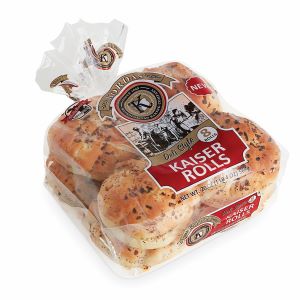 Source: Kordas’
Source: Kordas’
In the super-premium category, Kordas is poised to launch a new product — Gra8ful Bread — with a single 8 grain multi-seed variety. Packaging features what Mr. Kordas called an “eye-popping” design by Ery Burns, a doodle artist based in Bristol, England.
Comparing Gra8ful Bread to Metropolitan’s other product line, Mr. Kordas, a self-described Grateful Dead fan, likened the new product to a craft beer.
“It’s a nice hardy loaf of bread with crunch and fun seeds,” he said. “It’s also whole grain with a light sweetness that will be nice for breakfast but also works for sandwiches.”
Asked whether other varieties will be forthcoming, Mr. Kordas replied, “If it takes off, without a doubt.”
“It’s a pet project, but we’re putting some real effort behind it,” he said.
Metropolitan also is introducing a line of deli style products under the Kordas Metropolitan Baking Co. brand. Mr. Kordas said the line was developed in partnership with an “Iron Chef” restaurant chain and represents a break from oversized buns and kaiser rolls traditionally produced by baking companies.
“These are somewhat smaller,” he said. “The idea is not to have the bread overtake the meat.”
While Metropolitan has not made substantive changes to its line of mainstream bread and rolls, Mr. Kordas said the company’s pullman bread has experienced a “substantial increase” in unit volume sales. Rather than retail customers, he said various commissaries producing pre-made crimped sandwiches for institutional customers accounted for the increase in sales.
“Our bread and roll lines had been operating at capacity, but the bread lines have had some capacity,” he said. “The pullman business has tightened our bread capacity.”
La Brea moves into breakfast
Known principally for its savory sourdough bread and rolls, the La Brea brand of Aspire Bakeries, San Leandro, Calif., broadened its product portfolio last year by launching La Brea Bakery Cinnamon Raisin Loaf.
In promotional materials for retailers, Aspire said the variety was introduced to “capitalize on consumers’ continued breakfast-at-home consumption, preference for nostalgic flavor and to elevate meals at home.”
Citing 2022 data from Retail Info Systems, Aspire said 47% of adult consumers have eaten breakfast and lunch at home regularly since the start of the pandemic. The company said the bread is suitable for breakfast, as a sweet treat or a “sweet balance to your favorite grilled cheese.” The bread is sold as an unsliced loaf (though in-store bakeries will slice it for customers).
“We don’t have as many sweet-type breads,” said Chris Prociv, chief commercial officer – retail marketing and research and development, Aspire Bakeries. “There is a perception that sweeter breads — those with fresh fruity flavors — and sourdough don’t always go together.”
Ms. Prociv said the La Brea sourdough is mild and works with slightly sweet products. She said a cranberry walnut variety, sold just seasonally, was the company’s only bread with fruit inclusions.
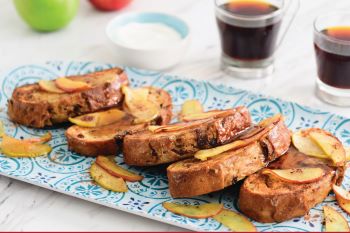 Source: La Brea Bakery
Source: La Brea Bakery
“We had no breakfast bread,” she said. “Raisin cinnamon is naturally sweet.”
Aspire developed the cinnamon raisin loaf in partnership with Kroger Co., which had the product exclusively for a couple months, Ms. Prociv said.
“Now the product is available to others,” she said, explaining that additional retailers were offered the opportunity to carry the cinnamon raisin bread beginning at the start of 2023. Ms. Prociv said its reception among other retailers has been positive, but Aspire will have a better sense of its potential when other customers go through shelf resets at different points in the first half of the year.
More than just filling a hole in the La Brea product line, Ms. Prociv said breakfast bread generally is not adequately represented in in-store bakeries. Aspire’s formulation uses an encapsulated version of Korintje cinnamon, a type of cinnamon with origins in Indonesia. The cinnamon remains encapsulated until the baking process, which is helpful since cinnamon in large amounts sometimes suppresses the fermentation process. When the cinnamon is released, it is particularly aromatic, a quality that adds to its appeal as the fragrance wafts through supermarkets where it is baked, the company said.
Another area of focus for Aspire in recent months has been a rebranding of the Cuisine de France line of bread and rolls to La Francaise, another Aspire brand. In the past, Cuisine de France was focused more heavily on savory products and La Francaise on items such as danishes, croissants and cinnamon rolls.
Ms. Prociv described the bread and roll line now sold as La Francaise as a complement to La Brea. The products are sold alongside one another.
“La Brea is authentic artisanal, while La Francaise is authentic European, with a thinner crust and lighter color than La Brea with not as much fermentation,” she said. “It’s like a French bread versus a sourdough. The flavor is a little lighter — it doesn’t have the caramelized flavor or crunch of La Brea. It’s also more accessible from a price point.”
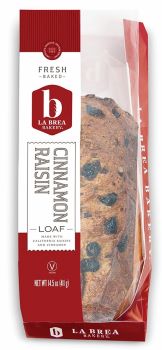 Source: La Brea Bakery
Source: La Brea Bakery
Cuisine de France is marketed in Chicago and Boston, with direct-store delivery in Chicago. The line is produced at Aspire plants in Brantford, Ont., and Northlake, Ill. With the transition, La Francaise becomes the third largest brand of Aspire, following La Brea Bakery and Otis Spunkmeyer. Two thirds of La Francaise Bakery’s business is retail and a third is foodservice.
An Aspire line that continues to grow is its La Brea Take & Bake products. The line performed well during the pandemic as a stay-at-home treat for those avoiding eating out at restaurants. More recently the line has been attractive to consumers looking to save money by eating in more often, Ms. Prociv said. The Take & Bake line also is attractive to retailers facing challenges attracting and retaining workers, she said.
Ms. Prociv said overall artisan bread sales have been flat, but the take-and-bake category has grown 8.2%. Over this period, La Brea has taken 2 additional points of market share, gains she said the La Brea brand captured in the face of new market entrants.
“For a lot of consumers, the rolls have become very popular with the option of baking a couple now and putting the rest in the freezer,” Ms. Prociv said. “It’s better than thaw-and-serve for in-store. Consumers still get the fresh baked texture and taste at home.”
Kathy Lenkov, communications specialist, added, “With high inflation, when people want to create more of a nice dining experience at home when they can’t go to a restaurant as often, you can create a breadbasket at home with Take & Bake. It is truly fresh bread at home.”
DKB expands breakfast line
Also taking a new direction in the breakfast bread category over the past year was Flowers Foods, Inc., Thomasville, Ga. Flowers expanded its breakfast line to include a savory variety of Dave’s Killer Bread.
“Taking a cue from popular flavor trends as well as our top-selling bagel item, we launched Epic Everything breakfast bread,” said Dan Letchinger, senior vice president, growth brands. “This bread features all the onion and garlicky deliciousness of the ‘everything’ flavor that consumers love, but we’ve also added a uniquely DKB twist by incorporating chia, flax and sesame seeds.”
The variety is USDA organic certified, non-GMO and has 12 grams of whole grains per serving.
Two 2022 introductions by Flowers under the Nature’s Own banner were Hawaiian bread and Perfectly Crafted sourdough varieties. Brent Bradshaw, senior vice president of core brands, described the Hawaiian bread as “soft-baked with a subtly sweet and fruit-forward” quality meant to “appeal to the whole family.” The Perfectly Crafted Sourdough is made with a sourdough starter but has an “unmistakably soft texture” and gentle flavor, he said.
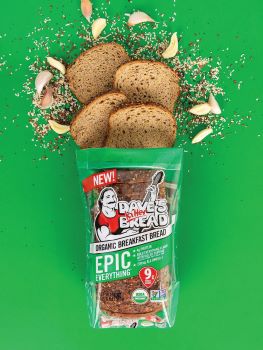 Source: Dave’s Killer Bread
Source: Dave’s Killer Bread
“Nature’s Own continues to innovate through consumer-guided innovation,” he continued. “The Nature’s Own brand team gathers consumer insights about the flavors, sizes, and other attributes consumers would like to see. Both Hawaiian and Sourdough scored on par with some of our best sellers in each line, so we felt confident consumers wanted these items.”
As part of the introduction, Flowers employed a marketing mix that included social, email, digital, and shopper-direct tactics like coupons,” Mr. Bradshaw said.
Also in connection with the introduction, the company held a sweepstakes for a nine-day trip for two to Hawaii. The company is running an ongoing sweepstakes in which it is giving away free bread for a year to one winner a month for 12 months.
“Consumer response to these two products has been great,” Mr. Bradshaw said. “In particular, our Hawaiian loaf has exceeded our expectations, highlighting a consumer preference for soft and sweet.”
Also introduced in 2022 under the Canyon Bakehouse brand of gluten-free products were Classic Brioche-Style Rolls and Hawaiian Sweet Rolls.
“While brioche rolls have been increasingly popular in the specialty bread category, gluten-free options were noticeably absent prior to this introduction,” Mr. Letchinger said. “Our challenge was to offer the delicious versatility of a classic brioche roll, but without any wheat flour or butter, which are two primary ingredients in traditional brioche rolls. Our brand legacy is built around inclusion and giving people back the sense of normalcy when it comes to eating bread. Something as simple as a dinner roll can have a tremendous impact when it lives up to the expectations of great taste, wholesomeness, and high-quality ingredients. A dinner roll seemed to be a perfect fit, given the success of other Canyon Bakehouse product extensions, including buns, bagels, and English muffins.”
Mr. Letchinger said the Hawaiian sweet rolls are available in the frozen bread section in grocery stores nationwide. The rolls follow on the rollout of Hawaiian Sweet bread in 2018.
Pepperidge adds brioche
Another company adding a brioche variety to its bread lineup in 2022 was Pepperidge Farm, Norwalk, Conn., part of the Campbell Snacks business of Campbell Soup Co. Farmhouse Brioche sandwich bread was introduced last fall. A spokesperson for Campbell Snacks described the variety as a “perfect balance of sweet, salty and buttery goodness.”
The growing popularity of brioche style bread prompted the introduction.
“Brioche continues be one of the largest growing flavors in the fresh bread and rolls category compared to any other form of bread,” the spokesperson said, citing Circana data. “As consumers look to try new forms and flavors, brioche offers a solution for a more elevated offering and is considered to be very versatile, suitable for any occasion.”
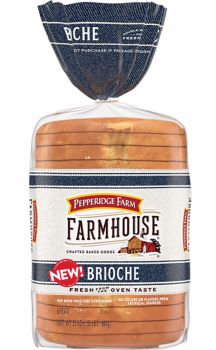 Source: Pepperidge Farm
Source: Pepperidge Farm
The spokesperson called the introduction “one of our most successful innovation launches in recent years thanks to fast distribution gains at nearly every retailer and consistently strong sales.”
The success was attributed to “robust marketing support” as well as ramped up in-store/online activations.
With the positive response to the brioche bread, the spokesperson said Pepperidge will launch brioche buns shortly, describing the rolls as “soft yet strong enough to stand up your bigger, bolder burgers.”
More broadly, Pepperidge has seen double-digit growth in its Farmhouse sandwich portfolio with flavors like Sourdough, Butter Bread, and Hearty White, the spokesperson said. While inflation has been felt by consumers, the fresh bread category has benefited from consumers choosing to eat more meals at home.
“Pepperidge Farm offers a full portfolio of premium baked goods to help elevate each at-home dining experience and continues to see strong momentum across our product segments,” the spokesperson said.
Bimbo Bakeries adding veggies
Taking a different approach to health and wellness over the past year was Bimbo Bakeries USA, Horsham, Pa., with the introduction this past January of Bimbo Bakeries USA Sara Lee White Bread Made with Veggies. The bread is fortified with vitamins A, D and E and features approximately one cup of vegetables per loaf, according to the company.
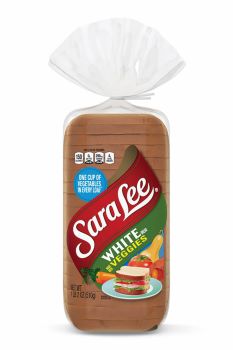 Source: Sara Lee
Source: Sara Lee“We know that mealtime can be a battle with picky eaters and little ones that aren’t exactly in love with vegetables,” Jinder Bhogal, senior brand manager at Sara Lee Bread, said when the product was launched. “We baked up the idea for our new Sara Lee White Bread Made with Veggies with families in mind to offer a deliciously unique option that’s new to the bread aisle. Made with love — and a cup of vegetables per loaf — we hope our fans will enjoy incorporating this new offering into breakfast, lunch, snack time and beyond.”
Also during the past year BBU, the US business of Grupo Bimbo SAB de CV, introduced a smooth multigrain variety of sliced bread to its Sara Lee Artesano line.
Made with oats and barley and free from high-fructose corn syrup, the 20-oz, 15-slice loaf is available at retailers nationwide.
BBU also offers golden wheat, brioche, bakery bread, maple and brown sugar, and cinnamon Artesano sliced bread varieties.
[ad_2]
Source link
